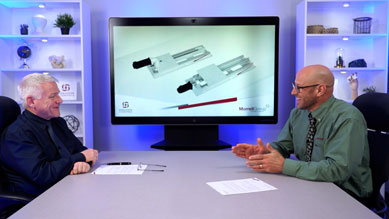A new trend has been developing in the mobile industry as newer, younger generations enter the workforce. These new operators of mobile machinery vastly prefer electronic controls to manual controls because they are more user-friendly, offer more capabilities, and improve troubleshooting. However, with these new electronic controls comes uncertainty. OEMs ask themselves, "What risks or benefits come with this technology? Are these controls worth it?" In this episode of Evolution in Controls, special guests Mauro Silva, Sales Manager for Mobile Electronics at Bosch Rexroth, and Kevin Kegarise, Vice President of Mobile Sales at Morrell Group help us understand the benefits of electronic controls.
According to Mauro, the goal and purpose of electronic controls is to improve machine performance and efficiency. Not every mobile application is suited for these controls, though. Still, as mobile machinery continues to develop and advance, especially with the shift to electric vehicles, electronic controls can be adapted and designed for customer-specific applications. Morrell Group has a team dedicated to the mobile industry with the expertise and knowledge to properly assess OEMs and identify how electronic controls can be integrated into their applications.
Partnering with Bosch Rexroth, Morrell implements electronic controls as a complete system. Rexroth understands the mechanical dynamics of components such as pumps, valves, and gearboxes, along with the limitations and inefficiencies of those components. Electronic controls can be programmed for those mechanical responses into available software, meaning OEMs no longer have to endure the learning curve that comes with integrating these controls.
For example, one of the most significant benefits is a way to implement diagnostic functions. Manual controls often take time to set up equipment to read diagnostics, but electronic controls can easily identify a failure much sooner with less effort. Just this benefit alone can significantly decrease machine downtime. Other easy-to-use features of electronic controls also help to increase uptime, such as video-game-like controls. There is less operator dependency by catering to the newer generations in the workforce.
Electronic controls provide more capabilities, more precision, and improved troubleshooting compared to manual controls. As these new controls continue to evolve, the electrification of mobile equipment also evolves, adding more possibilities. Additionally, Kevin predicts a significant focus on operator safety as a crucial benefit of electronic controls.
To learn more about Bosch Rexroth, visit https://www.boschrexroth.com/en/us/transforming-mobile-machines/electronification-and-iot/. To learn more about Morrell Group and its dedicated mobile industry team, visit https://morrell-group.com/.
Watch another episode
The Complexities of Engineering Linear Modules
Special guest Tom Rinke joins host Tim Wilson to discuss the challenges and complexities of engineering linear modules and systems.






